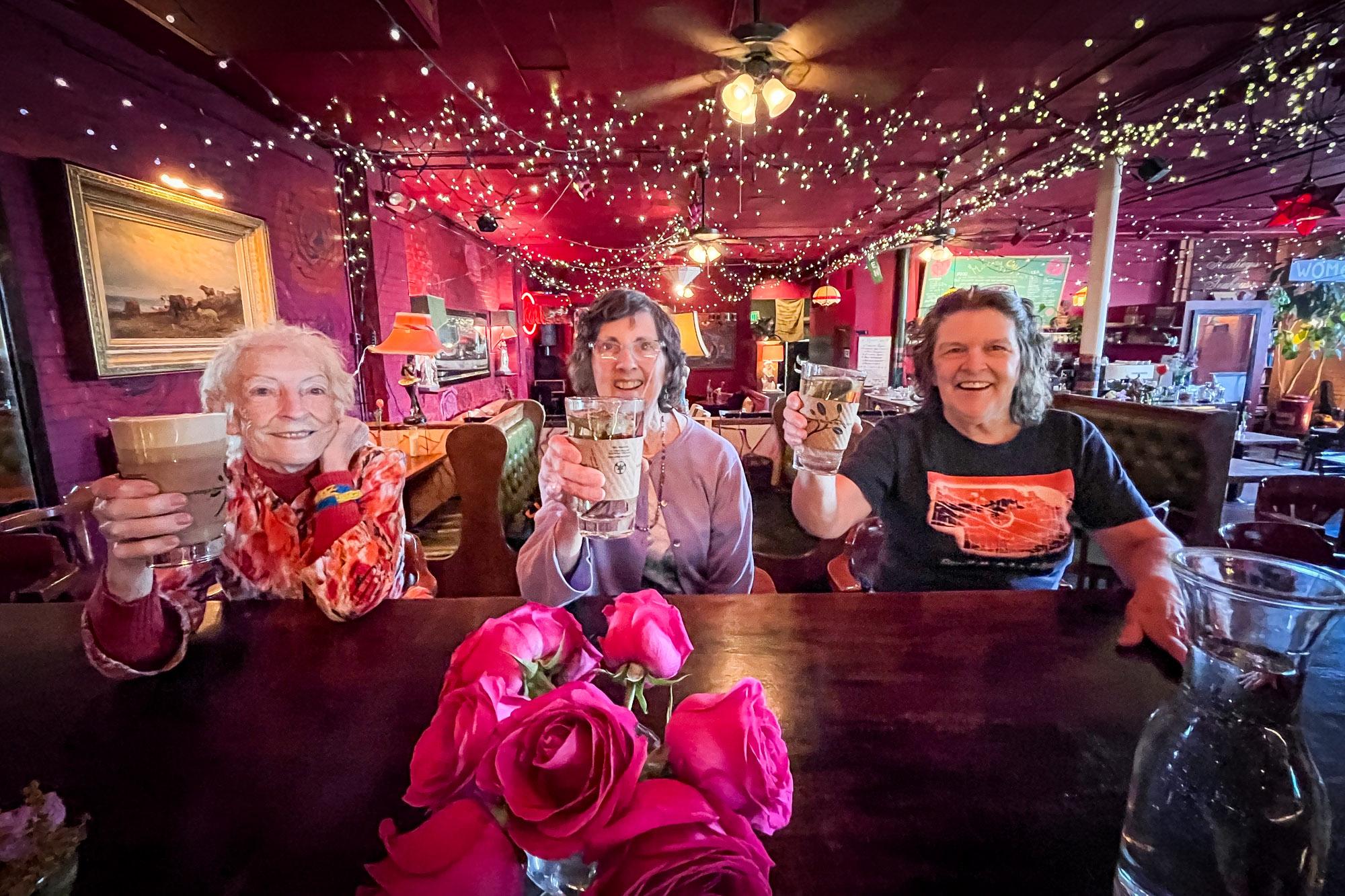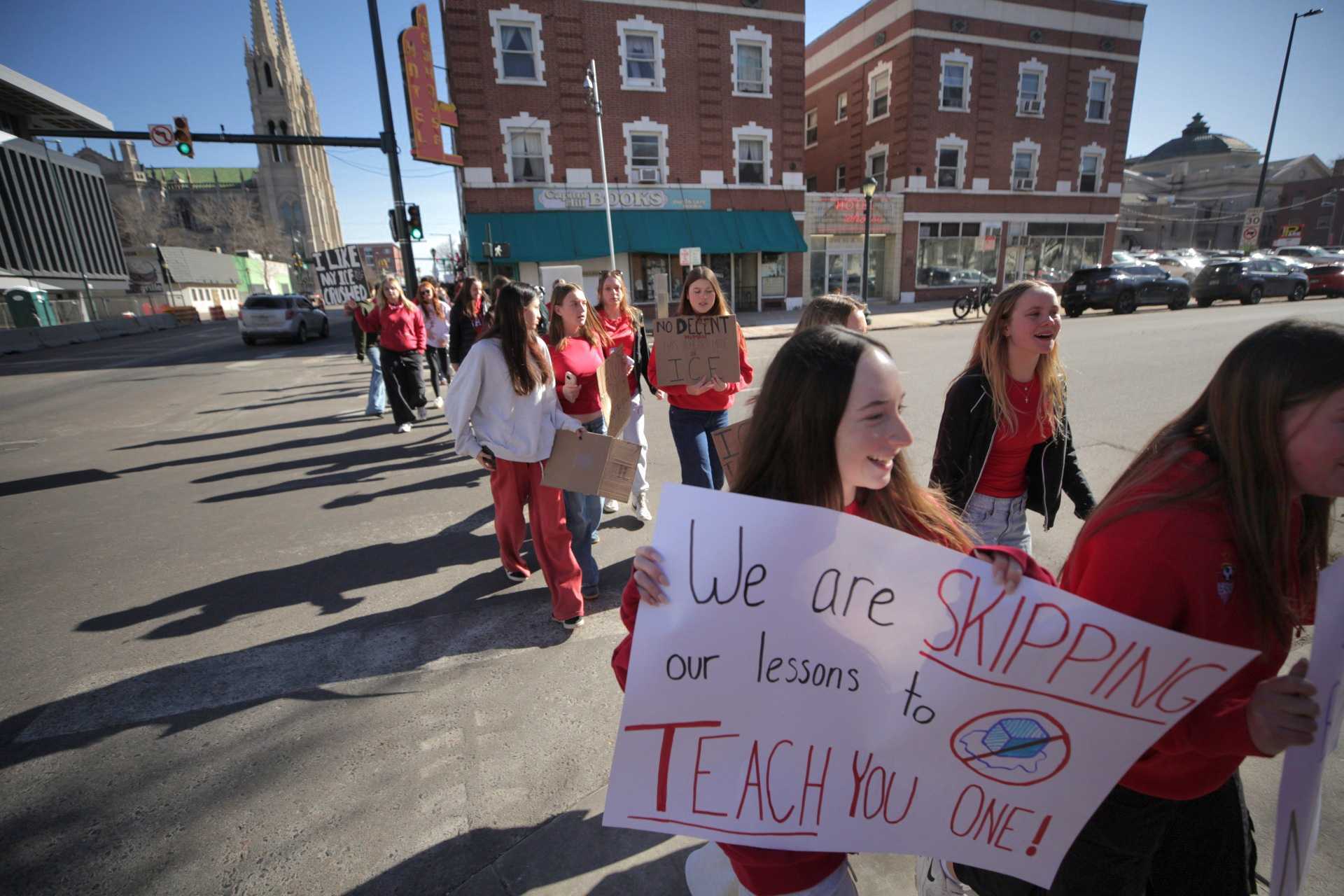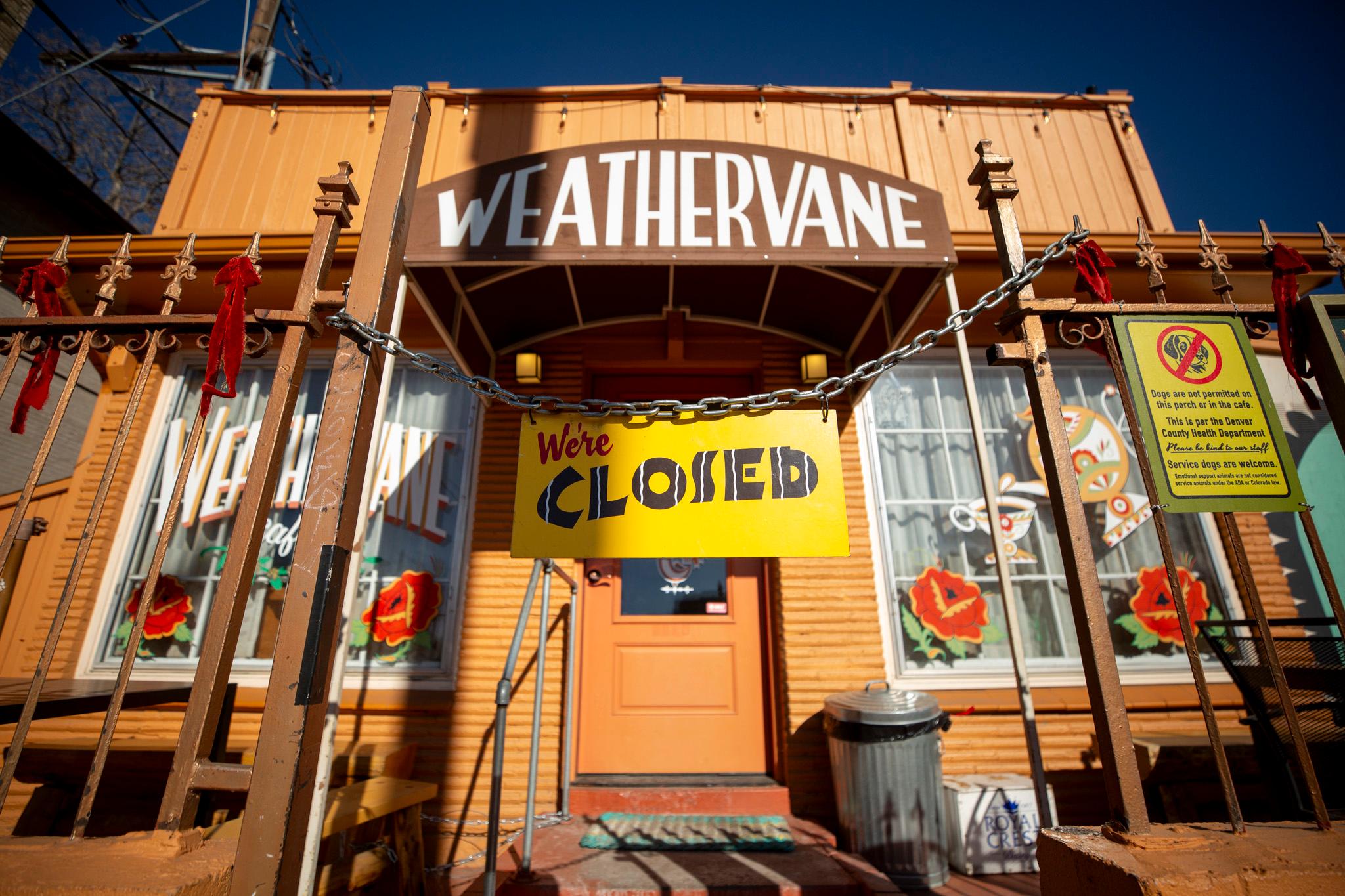Susan Doty, Celeste Rossmiller, Mary Alice Bramming and Judith Streit don't remember exactly how long they've been regulars at Mercury Café, a bar, restaurant and community space in Five Points that for decades has served up locally-sourced foods and arts programming.
The women have been friends for more than 40 years and have frequented the Merc long and often enough to give themselves the nickname "The Mercury 4." They even have a favorite booth that they say has softer and cushier seats than some of the restaurant's other tables.
"I really like the friendship with the Merc 4," Bramming said. "All three of those women are extremely bright and read a lot, and have lots of interesting things to discuss. So it's been a wonderful, wonderful quartet."
But when the pandemic began, the women stopped meeting at the café altogether to avoid risk of coronavirus infection. They still met often over the past two years, gathering at one another's yards or outdoor porches, though they worried they'd never be able to meet at their favorite booth again. During that time, the Mercury building went up for sale, and restaurants and shops all over Denver struggled to stay open.
But the Merc survived both the pandemic and change in ownership, and on April 7, the friends sat down in their booth for the first time since 2020 -- and since the Mercury's new owners had taken over.
Denverite met with three of the Merc 4 at their favorite restaurant (Bramming called in from out of state) to learn more about what Mercury Café -- and their friendship -- has meant to them over the 14 or so years that they've been regulars, and how it felt to be back.
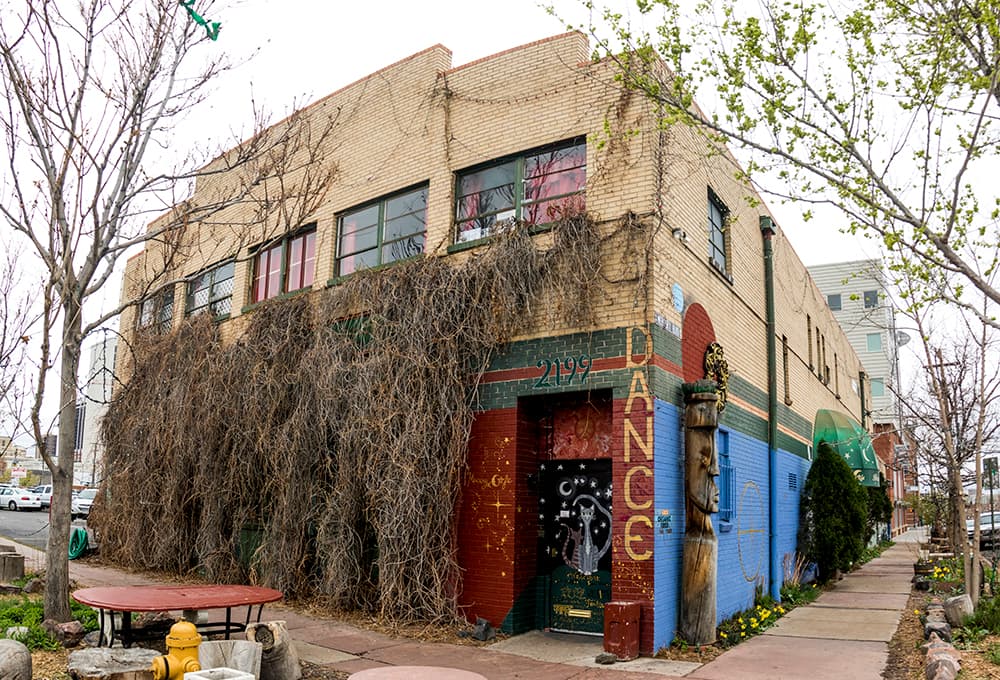
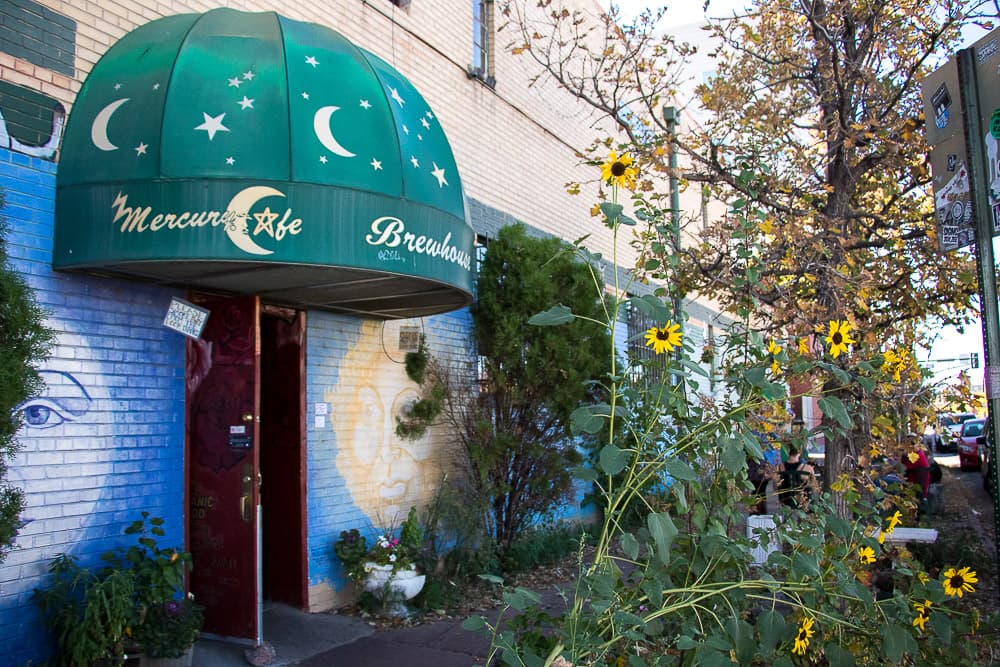
The friends met one another sometime around the '70s. They were brought together by their shared interests in religion and social justice.
They're all deeply passionate about theology or scripture. Rossmiller, Streit and Doty all at one point got their doctorates at Iliff School of Theology on the University of Denver campus, while Mary Alice has a Masters in Social Work. Streit is a Quaker, and the other three are Catholic.
"So three Catholics and a Quaker," said Rossmiller.
"...went into a bar," Doty joked, and the group broke out into laughter.
The Merc 4 is also passionate about issues like immigration, homelessness and the environment. They first bonded decades ago while volunteering for nonprofits and local soup kitchens, as well as through their antiwar and anti-nuclear activism. Back in the '80s, when Rocky Flats still operated as an active nuclear weapons plant, the women participated in demonstrations in protest of the plant.
"They had us circle Rocky Flats, which is miles around this place," Rossmiller said. "And we did it. There were enough people that showed up on that Saturday morning."
The group has a hard time placing exactly when they all met. They all grew up separately. Mary Alice and Rossmiller had been brought up in different parts of Colorado. Streit was an "army brat" and moved around for most of her childhood before ending up in Denver. Doty, meanwhile, had grown up in Des Moines, but moved to Chicago after college to work as a welfare worker. While there, she also participated in Chicago's famous civil rights demonstrations in the 1960s. Then, her husband got a job at a seminary in Denver in the '70s.
"So we moved out here against my kind of wishes. I thought it would just be a place where there were white skiers everywhere," Doty said. "But it turned out not to be true."
Streit and Doty met at women's ordination conferences in the '70s.
"I remember you introduced me to Susan," Streit said to Rossmiller.
"I remember Susan introducing me to you," Rossmiller said.
Meanwhile, Rossmiller and Bramming met in the late '70s at a social justice potluck at St Vincent Depaul. Rossmiller, realizing Bramming would get along with Streit and Doty, invited them all out to dinner. Bramming believes that was the first time they all went to Mercury Café.
"I remember that that's how I got to know Judith and Susan, because even though we kind of were in these circles, like the anti nuclear and the anti war and Project Salvador, I really didn't really didn't know you guys," she said. "It wasn't until we started going to the Merc."
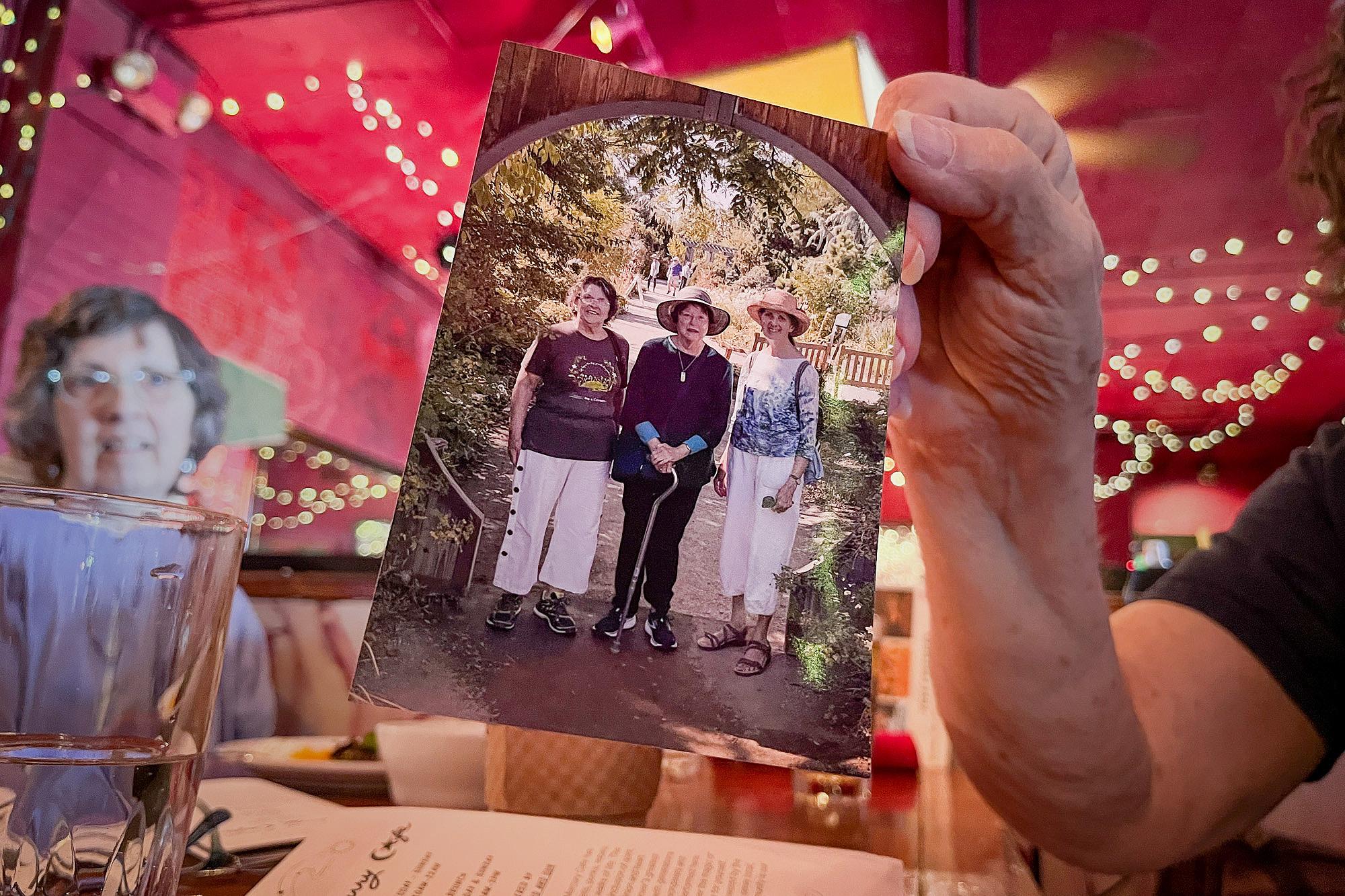
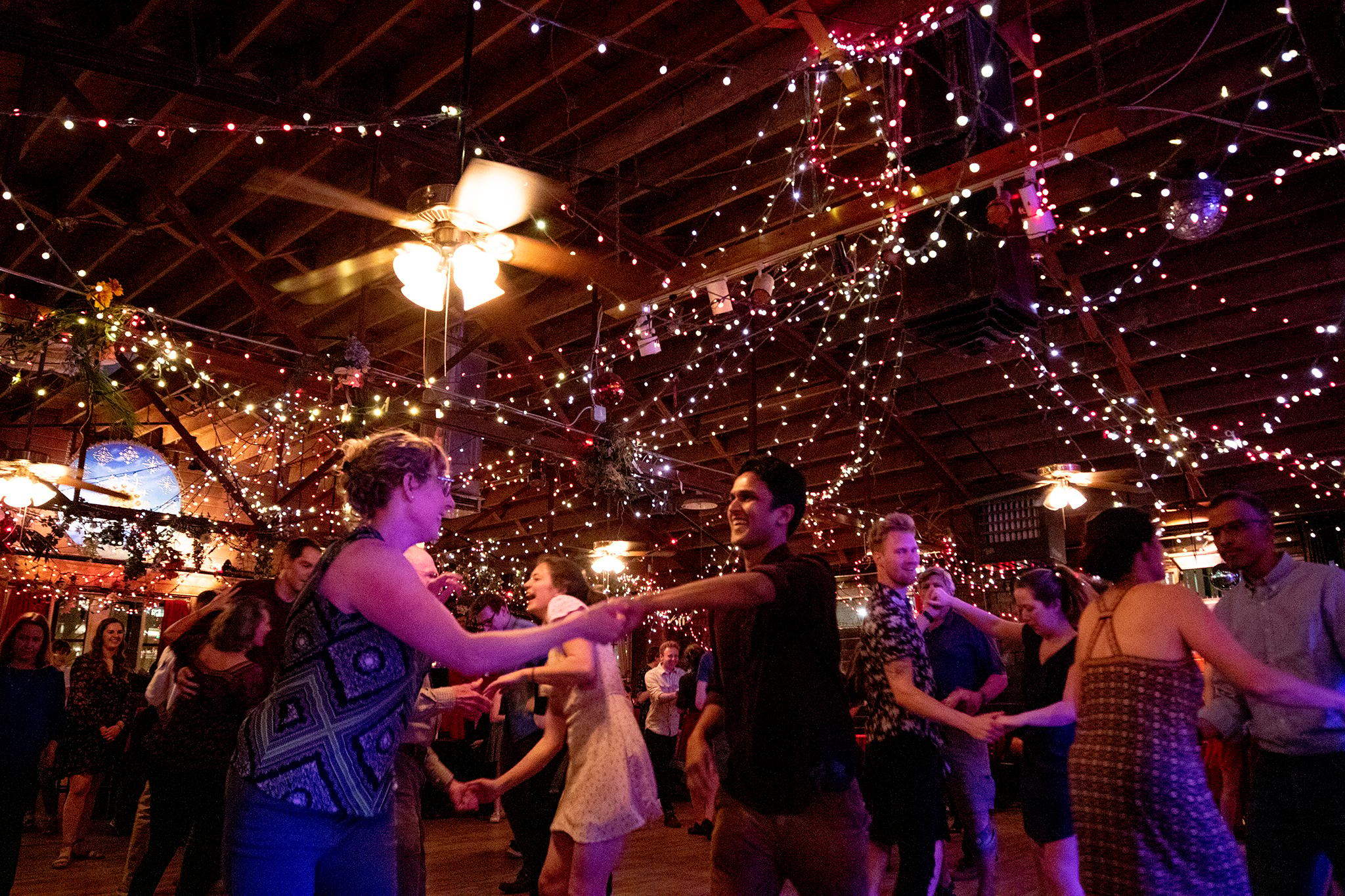
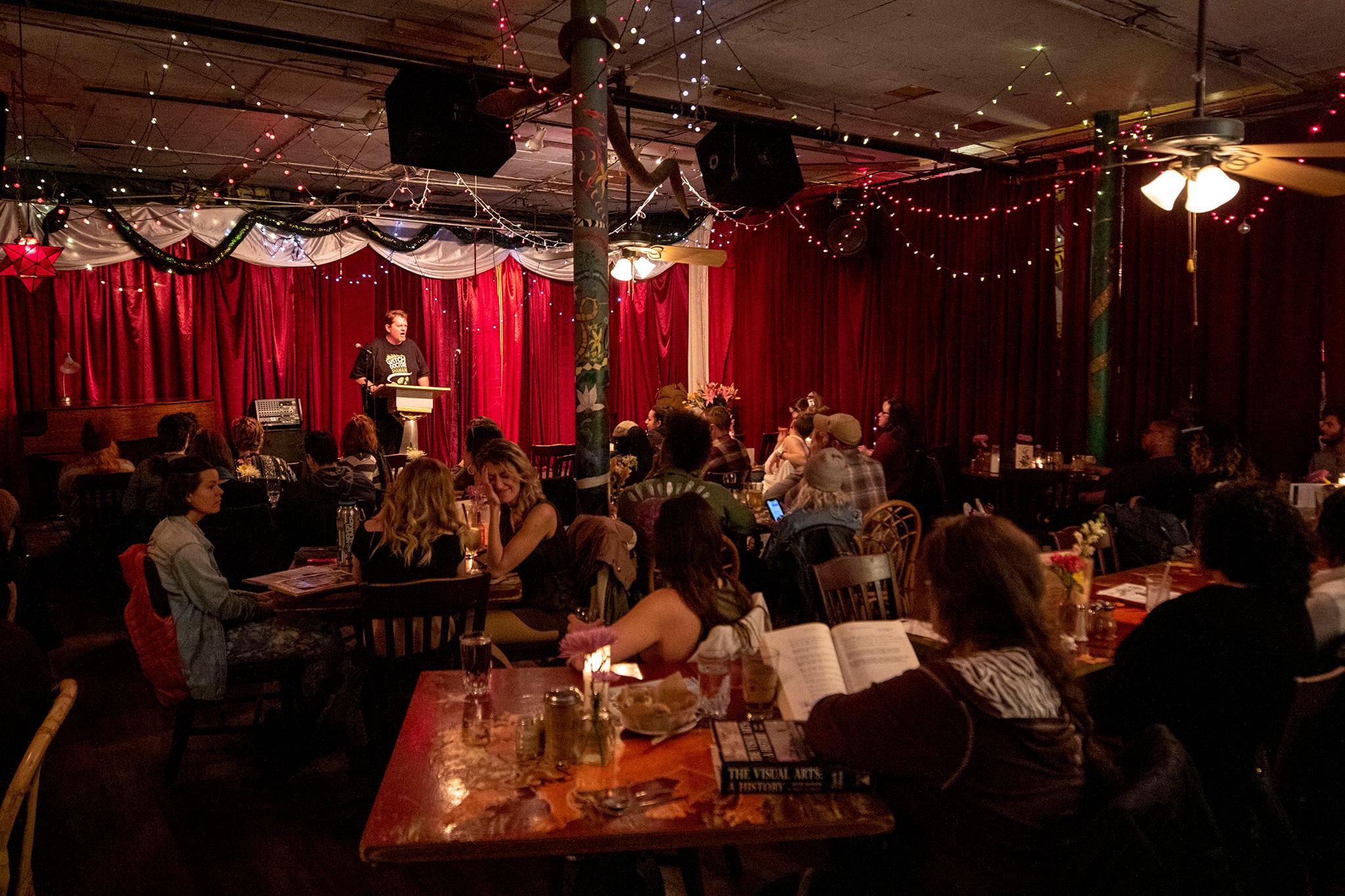
Mercury Café seemed the perfect place to accommodate their shared interests.
They liked the funky décor, the music and the arts programming. They enjoyed seeing people show up to dance at the Merc's many dance nights. Some of them have had their cards read by the cafe's resident Tarot reader.
"The minute you walk in here on an evening, and the lights, it's just joyful. I just remember the first time, I couldn't stop looking at it," Doty said. "In a neighborhood that's pretty poor and transient, to come in here, it's like coming into from the darkness to the light."
But a bigger part of the restaurant's appeal was that it offered organic, locally-sourced food and could accommodate dietary restrictions. Some of the Merc 4 didn't eat meat or gluten, and Mercury Café offered gluten free and vegetarian options.
It also had a strong social justice bent.
"Which would be very attractive to all of us," Rossmiller said. "One of the climate marches that happened through Denver, we gathered in this room afterwards, and the next room, and had some more speeches."
The Mercury 4 said the neighborhood surrounding the café has changed a bit since they last visited two years ago. They remembered there being more open parking lots surrounding the Merc and people sleeping in tents nearby. Now, they said, those lots have filled in with new buildings.
"Now there's no place for the poor people to go," Rossmiller said.
But they said the café itself looks much as they remember it, albeit with a couple new furniture pieces and a slightly reduced menu. They noted that there were also more flowers in vases throughout the restaurant and admired how the flowers matched the roses painted on Mercury's walls.
That the restaurant had remained mostly unchanged, and that they were there at all, was a relief to the Merc 4. For several months during the pandemic, the future of the Five Points institution looked uncertain when, in March 2021, founder and longtime owner Marilyn Megenity announced she planned to sell it. The Merc 4 worried their favorite spot was going to close for good.
But that June, Megenity sold the restaurant to entrepreneurs Danny Newman, Christy Kruzick and Austin Gayer, who promised to keep it running much as it had been. The Merc 4 say they're happy the new owners are interested in maintaining the space's traditions.
"It is a nice, funky place, and I'm extremely happy that the new owners are keeping it instead of tearing it down," Bramming said.
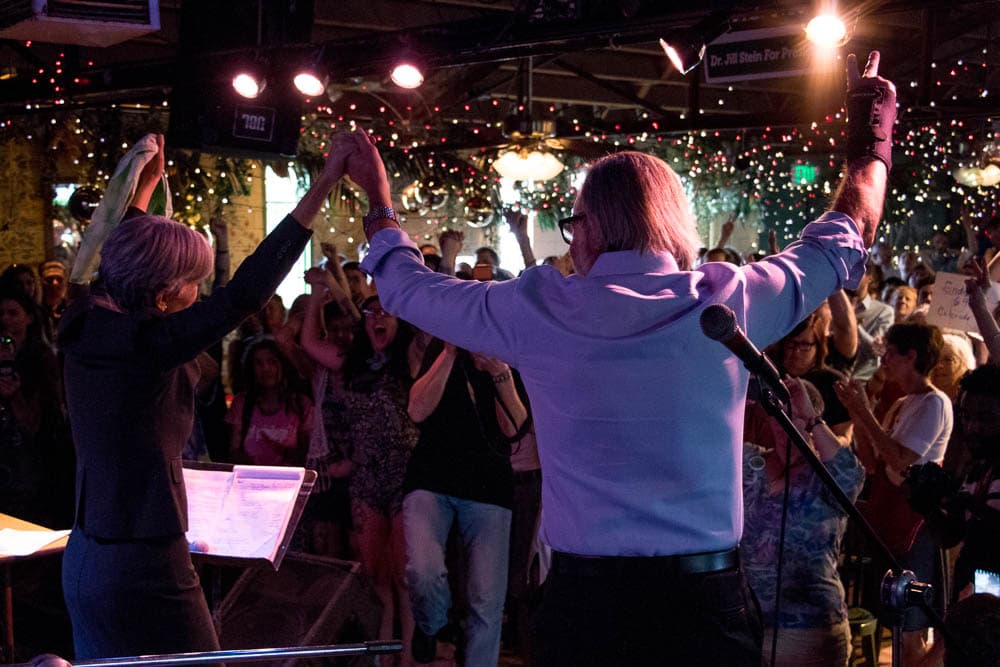
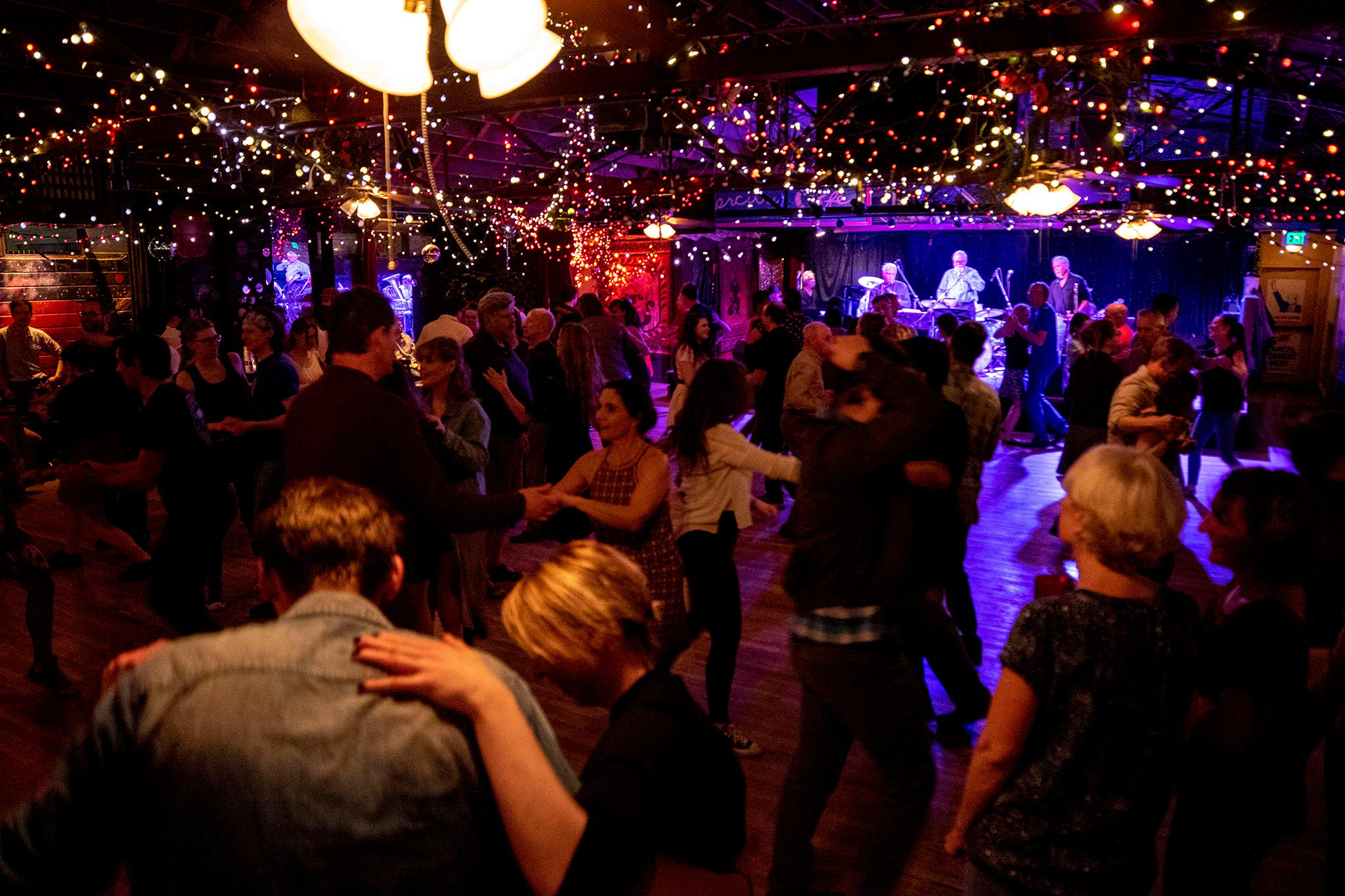
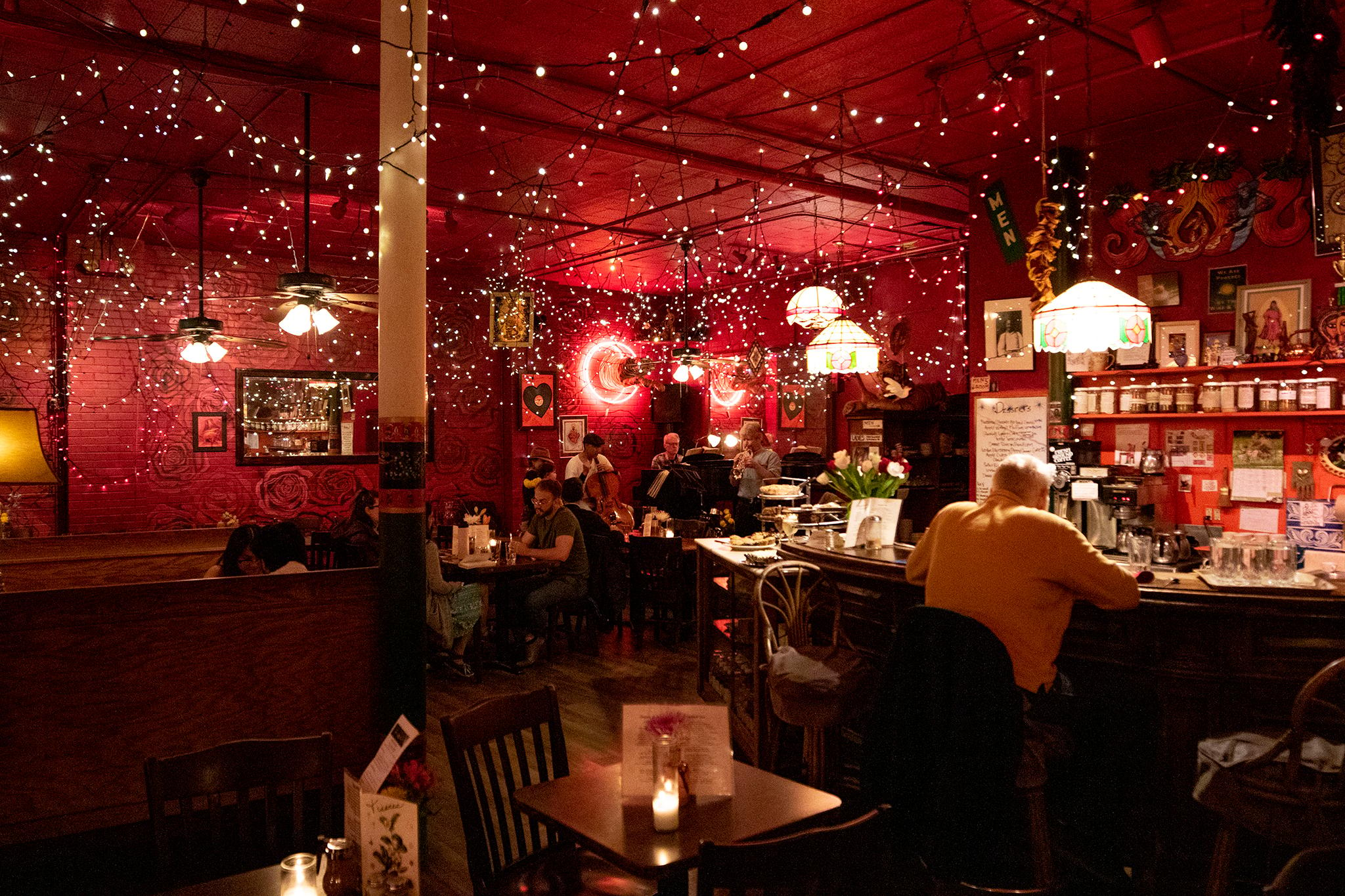
Denverite asked the Merc 4 what it was about their friendship that has helped it to last as long as it had.
"We don't have any other friends," Doty joked, and they all laughed, before she added, "I think we, I don't know, elevate each other."
Streit pulled out a clipping from a recent New York Times essay called, "One Part of Your Life You Shouldn't Optimize," by Brad Stulberg, and read a passage out loud.
"Is there pleasure -- and a certain nobility -- in solitude? Of course, especially for introverts like myself," she read. "But even the Buddha himself directed his followers to seek companionship.
"In the Pali Canon," she continued, "one of the oldest remaining Buddhist texts, the Buddha's loyal attendant, Ananda, approaches his master and asks whether it's true that 'good friendship, good companionship, good comradeship' make up half of the spiritual life. 'Not so, Ananda! Not so!' the Buddha replies sternly. 'This is the entire spiritual life, Ananda -- that is, good friendship, good companionship and good comradeship.'"
Doty pointed out that the word for "idiot" in Greek is rooted in the word "idios," which means, roughly, "one's own," or "private."
"So, the moral of the story is, be around people. Make friends!" Doty said.
They discussed how hard it has been for many people to maintain relationships during the pandemic, in the age of social distance.
"I think one of the things that makes the difference is we've just been at it for so long," Streit said. "I think for a lot of people that have had not such long relationships, it's harder to hang on."
Doty then referenced writer and theologian C.S. Lewis, who says there are four different kinds of love: storge (affection), philia (friendship), eros (romantic) and agape (charity).
"I think there's only one kind of love," Doty said. "So I disagree with C.S. Lewis."
"I'm with you," Streit said. "Love has many different expressions, but it's all it's all the same."
Rossmiller said she taught Aristotle's ethics for years at MSU Denver. She said that in his Nicomachean Ethics, the philosopher speaks at length about the importance of friendship."
"Aristotle has three kinds of friendship. Friendship of utility, friendship of pleasure, and friendship of noble souls," she said, before gesturing around the table meaningfully. "And, pleasure and noble souls."

